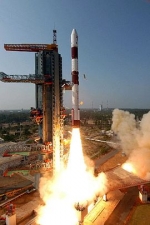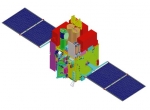Displaying items by tag: PSLV
Polar Satellite Launch Vehicle (PSLV)
The Polar Satellite Launch Vehicle, commonly known by its abbreviation PSLV, is an expendable launch system developed and operated by the Indian Space Research Organisation (ISRO). It was developed to allow India to launch its Indian Remote Sensing (IRS) satellites into Sun synchronous orbits, a service that was, until the advent of the PSLV, commercially viable only from Russia. PSLV can also launch small size satellites into geostationary transfer orbit (GTO). The PSLV has launched 52 satellites (26 Indian satellites and 26 foreign satellites) into a variety of orbits to date (May 2012).
Astrosat
Astrosat is India's first dedicated astronomy satellite and is scheduled to launch on board the PSLV in 2012. After the success of the satellite-borne Indian X-ray Astronomy Experiment (IXAE), which was launched in 1996, the Indian Space Research Organization (ISRO) has approved further development for a full fledged astronomy satellite - Astrosat.
A large number of leading astronomy research institutions in India and abroad are jointly building various instruments for the satellite. Important areas requiring broad band coverage include studies of astrophysical objects ranging from the nearby solar system objects to distant stars, to objects at cosmological distances; timing studies of variables ranging from pulsations of the hot white dwarfs to active galactic nuclei (AGN) with time scales ranging from milliseconds to few hours to days.
Astrosat is currently proposed as a multi-wavelength astronomy mission on an IRS-class satellite into a near-Earth, equatorial orbit by the PSLV. The 5 instruments on-board cover the visible (320-530 nm), near UV(180-300 nm), far UV(130-180 nm), soft X-ray (0.3-8 keV and 2-10 keV) and hard X-ray (3-80 keV and 10-150 keV) regions of the electromagnetic spectrum.
Mission
Astrosat will be a proposal-driven general purpose observatory, with main scientific focus on:
- Simultaneous multi-wavelength monitoring of intensity variations in a broad range of cosmic sources
- Monitoring the X-ray sky for new transients
- Sky surveys in the hard X-ray and UV bands
- Broadband spectroscopic studies of X-ray binaries, AGN, SNRs, clusters of galaxies and stellar coronae
- Studies of periodic and non-periodic variability of X-ray sources


